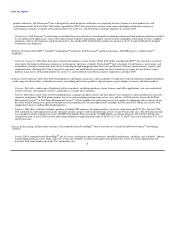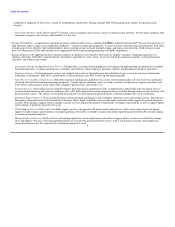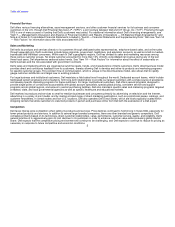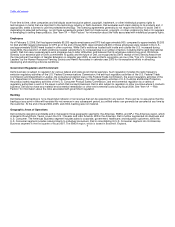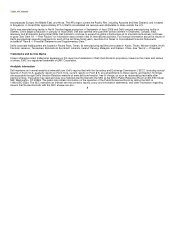Dell 2005 Annual Report Download - page 16
Download and view the complete annual report
Please find page 16 of the 2005 Dell annual report below. You can navigate through the pages in the report by either clicking on the pages listed below, or by using the keyword search tool below to find specific information within the annual report.
Table of Contents
ture. Before becoming Chief Information Officer, Ms. Sheskey was Dell's Vice President of information technology for the Americas Region. In
this role, she had responsibility for the development, deployment, and support of Dell Global Sales, Services, Manufacturing and Fulfillment
Systems. Ms. Sheskey joined Dell in 1993 and has held various executive positions in the information technology organization where she has
provided leadership vision and delivered strategic IT solutions to the areas of sales, manufacturing, fulfillment, services, procurement, data
warehouse, finance, and human resources. Prior to joining Dell, Ms. Sheskey compiled key planning, development and operational experience
during 20 years with Ameritech's corporate and services functions and at Ohio Bell. Ms. Sheskey graduated from Miami University in Oxford,
Ohio with a bachelor's degree in Zoology and Geography.
Lawrence P. Tu — Mr. Tu joined Dell as Senior Vice President, General Counsel and Secretary in July 2004, and is responsible for overseeing
Dell's global legal department and governmental affairs. Before joining Dell, Mr. Tu served as Executive Vice President and General Counsel at
NBC Universal for three years. Prior to his position at NBC, he was a partner with the law firm of O'Melveny & Myers LLP, where he focused on
high technology, Internet and media related transactions, and where he served five years as managing partner of the firm's Hong Kong office.
Mr. Tu's prior experience also includes serving as General Counsel Asia-Pacific for Goldman Sachs, attorney for the U.S. State Department
and law clerk for U.S. Supreme Court Justice Thurgood Marshall. Mr. Tu holds Juris Doctor and Bachelor of Arts degrees from Harvard
University, as well as a Masters degree from Oxford University, where he was a Rhodes Scholar.
ITEM 1A — RISK FACTORS
There are many risk factors that affect Dell's business and the results of its operations, some of which are beyond Dell's control. The following is a description
of some of the important risk factors that may cause the actual results of Dell's operations in future periods to differ substantially from those currently
expected or desired.
• Declining general economic, business, or industry conditions may cause reduced net revenue. Dell is a global company with customers in virtually every
business and industry. If the economic climate in the U.S. or abroad deteriorates, customers or potential customers could reduce or delay their technology
investments. Reduced or delayed technology investments could decrease Dell's net revenue and profitability.
• Dell's failure to maintain a cost advantage may result in reduced market share, revenue, and profitability. Dell's success is partly based on its ability to
profitably offer its products at a lower price than its competitors. However, many companies compete with Dell globally in all aspects of its business. Dell
cannot guarantee that it will maintain its cost advantage if its competitors improve their cost structure or business model, or take other actions that affect
Dell's current competitive advantage. Dell may lose market share, revenue, and profitability if it does not maintain its cost advantage.
• Dell's ability to generate substantial non-U.S. net revenue faces many additional risks and uncertainties. Sales outside the U.S. accounted for approximately
41% of Dell's consolidated net revenue in fiscal 2006. Dell's future growth rates and success are dependent on continued growth in international markets.
Dell's international operations face many risks and uncertainties, including varied local economic and labor conditions, political instability, and unexpected
changes in the regulatory environment, trade protection measures, tax laws (including U.S. taxes on foreign operations), and foreign currency exchange
rates. Any of these factors could adversely affect Dell's operations.
• Dell's overall profitability may not meet expectations if its product, customer, and geographic mix is substantially different than anticipated. Dell's profit
margins vary among its products, customers, and geographies. If Dell's mix of any of these is substantially different from what it anticipates in any particular
period, Dell's profitability could be less than expected.13


